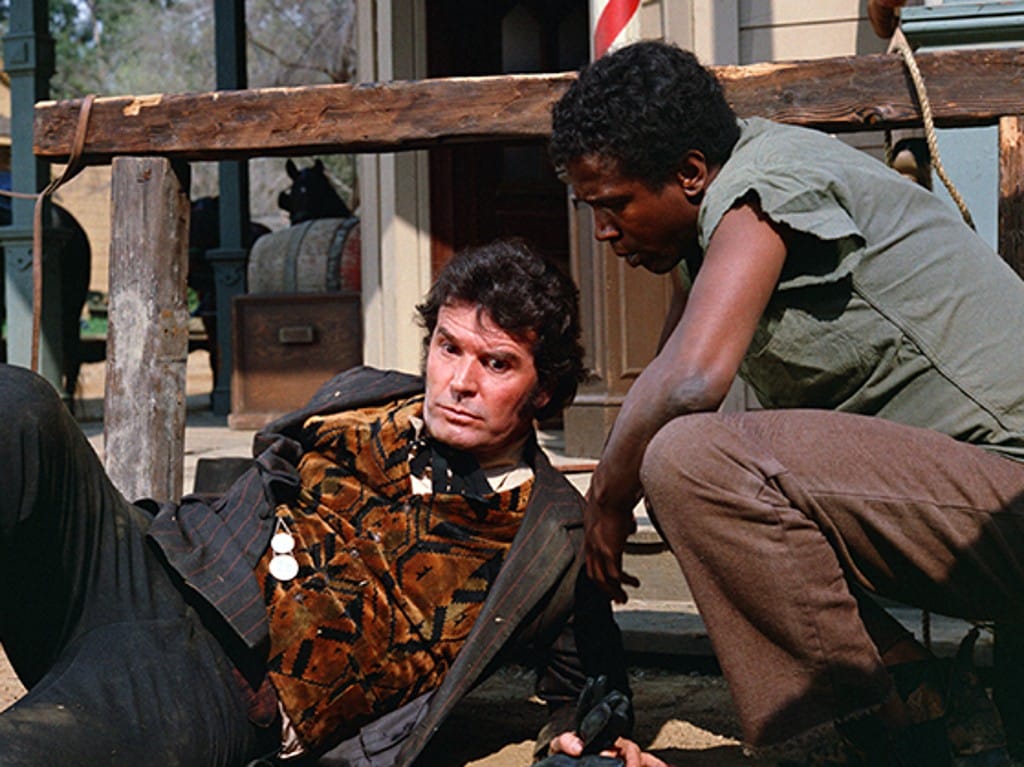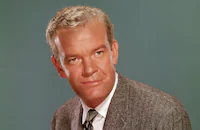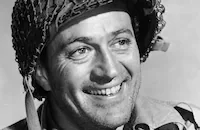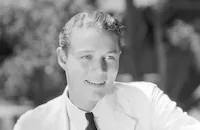Skin Game

Brief Synopsis
Cast & Crew
Paul Bogart
James Garner
Lou Gossett
Susan Clark
Brenda Sykes
Edward Asner
Film Details
Technical Specs

Synopsis
In 1857 Missouri, Quincy Drew and Jason O'Rourke operate a successful confidence game in which Quincy, who is white, repeatedly sells Jason, who is black, as a slave. Although Jason was born a free man in New Jersey, he assumes a Southern slave's demeanor to make their ruses believable, then later escapes and meets Quincy outside town to split their profits. Despite their success, Jason is tiring of the game, and after he and Quincy encounter the ruthless slave hunter Plunkett leading a group of chained black men and women, Jason insists that they stop. Quincy, who is also unnerved by Plunkett, reluctantly agrees, but only after they try one more job across the state line in the Kansas Territory. At the first Kansas town, they find themselves in the throes of the hotly contested referendum over Kansas' admission to the Union as a slave or Free State. Because Jason is not allowed to sleep inside the town hotel, he grudgingly goes to the town livery, where a pretty young black woman named Naomi is amused to see him chaining himself to a post. Jason is attracted to Naomi and saddened when she reveals that she is being sold because her young master, with whom she played as a child, was ordered to sell her by his new wife. Meanwhile, as Quincy takes a bath, a woman who earlier picked his pocket tries to steal the rest of his belongings. She pretends not to know him, but finally relents and introduces herself as Ginger, a fellow con artist and kindred spirit. The next day, Jason asks Quincy to bid up to $1,000 to buy Naomi, which he does, telling Ginger Naomi is Jason's birthday present. Just before Jason is sold, notorious abolitionist John Brown gallops into town with a band of supporters, quickly gathers all the slaves into wagons, then rides out of town. In the chaos, Ginger disappears, after which Quincy follows the wagon tracks. While stopped by a stream, Quincy is accosted from behind by an Indian, who turns out to be Jason, spewing sounds he thought sounded like Indian words. The two men start to bicker about their situation and decide to split their money but find that Ginger has taken their money and replaced it with a derisive note. Not wanting to stay in Kansas, Quincy convinces Jason to back go to Missouri for one last chance to recoup their losses. As they try the game in the town of Bitter End, they again see Plunkett, who recognizes them and bids on Jason. Although Quincy tries to avoid selling Jason to Plunkett, Bonner, the man who had bought Jason in Dirty Shame, suddenly arrives to say that he is Jason's rightful owner. A brawl erupts, resulting in Jason's being sold to Plunkett by Bonner and Quincy being put in jail. Some time later, Jason finds himself chained in the livery next to Naomi, while Quincy is visited in jail by Ginger, who pretends to be his abandoned pregnant wife. Clutching Quincy to her, Ginger slips the jailer's keys into his pocket, along with some money and a small gun. After Quincy escapes and meets Ginger, she reveals that she read about their capture in the newspaper and decided to help. Quincy then relates all of the various confidence games that he and Jason have run over the years, and says that he will find Jason, no matter how long it takes. He and Ginger then agree to be partners. Two months later, Plunkett has taken Jason and Naomi to Texas, where they are sold to Calloway, a wealthy plantation owner. Because Calloway seems kind, Jason tells him that he was born a free man and appeals to his fairness. To his shock, Calloway tells him never to speak like that again and orders him whipped. Meanwhile, Ginger and Quincy search for Jason by assuming guises as a medical team or missionaries searching for a slave carrying a mysterious and highly contagious "spasmodic lung pest infestation." As the months pass, under the tutelage of Naomi, Viney and Uncle Abram, Jason becomes attuned to life as a slave. One day, when Jason is sent to the retrieve something in the smokehouse, he is frightened by several African tribesmen. Fearful that they are cannibals, Jason runs away, but is later told that they are the Songhais. Although the importation of slaves has been illegal for decades, the Songhais have been brought to America because they are unusually good with horses. Jason soon befriends the Songhais and tries to talk them into escaping with him to Mexico, which is less than one hundred and fifty miles away. They do not understand him, but when Jason starts to talk gibberish that sounds as if it could be African, they respond by bowing, as if he were their chief. Soon, Quincy and Ginger arrive at the Calloway plantation posing as missionaries looking for the disease-carrying slave. Quincy, overjoyed finally to find Jason, insists on isolating him, while at the same time receiving $500 from Calloway for a serum that purportedly will save his family from a terrible death. When Quincy and Jason are alone, they embrace and laugh, but instead of leaving immediately, Jason insists that they take along all of the other Calloway slaves. Although irritated over Jason's ultimatum, Quincy agrees, and that night makes a plan with Ginger whereby she will leave first and arrange for fresh horses on the trail. The next day, after Ginger has left, Plunkett rides onto the plantation and tells Calloway the truth about Ginger and Quincy. Calloway and Plunkett then go after Jason and Quincy, who are saved by the Songhais, who respond to Jason's commands. After a scuffle, Plunkett is about to shoot Quincy when Jason shoots and kills him instead. Now Jason, Naomi, the Songhais and slaves Viney, Ned and Uncle Abram, climb into the family carriage and race away alongside Quincy. Soon they arrive at an abandoned building where Ginger was to have left fresh horses. At first they think that she has taken the money for herself, but soon see the horses and continue on to Mexico. In a small border town, Ginger happily greets everyone, and they have a celebration that night. Although Quincy talks to Jason about heading west to start a new game in the gold rush area, Jason is reticent about leaving the others and says that he will join Quincy later. Quincy says that they are like brothers, but Jason points out that they are different because he can be bought and sold. The next day, Ginger and Quincy are riding on the range, when Quincy reveals that Jason stole their $3,000 stake in the middle of the night. Ginger is shocked that Quincy watched Jason steal the money and did nothing, but Quincy assures her that it is fine because he has the bankbook for their Chicago account that contains $10,000 of their money. Ginger holds up the bankbook and says that she has always found that the best way to hold a man is to get a firm grip on his bankbook, then gallops ahead, with Quincy in pursuit, saying that he loves her.

Director
Paul Bogart
Cast

James Garner
Lou Gossett

Susan Clark

Brenda Sykes
Edward Asner

Andrew Duggan

Henry Jones
Neva Patterson

Parley Baer

George Tyne

Royal Dano
Pat O'malley

Joel Fluellen
Napoleon Whiting

Juanita Moore
Dort Clark
Robert Foulk
Athena Lorde
George Wallace

James Mccallion
Tracy Bogart
Mary Rings

Don Haggerty
Jason Wingreen
Sam Chew
Al Checco
Jim Boles
Paris Nathan Earl
Edward Lee Mcclain
Eugene Smith
Bill Terrell
Owen Bush
Dan Borzage
Claude Stroud
Forrest Lewis
David Alan Bailey
Jon Gabrielson
Wanda Spell
Agustin Vallejo
Maria E. Vega
Burt Mustin
Michael B. Skinner
Fred Carson
Syl Lamont

William Henry
Tom Monroe
John Marlin
Luis Delgado

Bob Steele
Bob Morgan
Crew
Robert Anderson
Charles G. Arnold
Sharyn Bailey
Gordon Bau
Louise Benjamin
Michael A. Benson
Glen Bird
Herman Blumenthal
Jerry Brown
R. Bishop Buckley
Don Cady
Roy Clark
Cliff Coleman
Virginia Cook
Betty Crosby
Jack Cunningham
Vince Deadrick
Rudy Doucette
Gordon Douglas
Ed Dutton
Millard Evans
Dick Farnsworth
Fred Faust
James Garner
John L. Goddard
Kent Hays
Paul Heller
Marge Henderson
Ora Hudason
Ace Clyde Hudkins
Dick Hudkins
Bobby Johnson
Reggie Jones
Harry Keller
Hal Klein
George P. Knauff
Fred Koenekamp
Fred Lerner
Carl Lindstrohm
Gene Lloyd
James Martell
Pierre Marton
S. J. Mcgee
Michael Mclean
Ed Morey Iii
Tye Osward
Reggie Parton
Victor Paul
James Payne
Jack Perkins
Jack Petty
Thalia C. Phillips
Carl C. Pitti
Corky Randall
Glenn H. Randall Jr.
Jean Burt Reilly
Jack Roberts
Meta Rosenberg
Herb Rundenow
Mallo Savitt
David Shire
Richard Alan Simmons
Ken Spalding
Barry Steinberg
Walter Thompson
Mel Traxel
Kenny Walker
Vernon White
Sherry Wilson
Harry Zubrinsky

Videos
Movie Clip




Film Details
Technical Specs

Articles
Skin Game

Skin Game
Quotes
Trivia
Notes
Some contemporary sources refer to the film as The Skin Game, although the onscreen credits list the title without the initial article. As the film opens, immediately after the Warner Bros. logo, a title card reading "Missouri, 1857" appears, followed by the opening credits, which roll over a sequence in which James Garner approaches the small town of Dirty Shame on horseback, leading Lou Gossett, who is on foot, by a tether.
According to information in news items, in 1964, Universal Pictures bought Richard Alan Simmons' original story "Skin Game." From 1966 through 1969, Hollywood trade papers reported that the screenplay was being written by Peter Stone, and co-produced by Stone with Harry Keller. In early 1970, Burt Kennedy was announced as the film's director, and according to a April 28, 1970 Daily Variety news item, Warner Bros. had acquired the property and planned to produce the picture with Garner's Cherokee Company. As a Warner Bros. press release noted, the venture marked the first time that Garner had returned to work on the Warner Bros. lot in more than ten years.
In the late 1950s, Garner had been under contract to the studio, which produced the successful television series Maverick, which starred Garner and launched his film career. Skin Game became part of a production deal between Warner Bros. and Garner that included a projected television series in which he would star. The series, titled Nichols, ran on the NBC television network from September 1971-August 1972. Executive producer Meta Rosenberg had, for many years prior to becoming a producer, been Garner's agent.
According to Warner Bros. press releases and news items, in March 1971, director Paul Bogart was replaced by Gordon Douglas for approximately two to three weeks after Bogart contracted hepatitis. Prior to the film's release, Stone, who did not receive screen credit, requested that his name be taken off the credits because, as he stated later in a letter to the editor of New York magazine, "I no longer consider it based upon my screenplay...[it] was rewritten by a second writer who did not receive credit, on orders of the star-who is also the film's producer-thereby altering the theme, the plot and, most important, the characters." The letter was written in response to the review of the film by New York's film critic, Judith Crist, who noted in her review that Stone had written the screenplay under the pseudonym Pierre Marton [which Stone had previously used for his contribution to the 1966 film Arabesque] and criticized his work. Stone took exception to the criticism and accused Crist of blaming his work on the film, instead of those he thought responsible. According to Filmfacts, the "second writer" to whom Stone referred in his letter was possibly John L. Goddard, who was credited as a contributing writer in studio production files.
As depicted in the film, in 1857, citizens of the Kansas Territory were embroiled in the issue of whether the territory should enter the Union as a Free State or a Slave State. Although Kansas eventually was admitted as a Free State, for many years, both before and after its admission, it became known as "Bleeding Kansas" because it was the site of violent clashes between those supporting and opposing slavery. Militant abolitionist John Brown (1800-1859), who is portrayed by Royal Dano in the film, led or authorized many raids throughout Kansas in the 1850s, some of which resulted in the deaths. Brown has been portrayed in many other films. For additional information about him, please consult the entry above for the 1940 Warner Bros. film Santa Fe Trail.
As reported in an undated, but contemporary, Hollywood Reporter news item found in the production file on the film in the AMPAS Library, Elbert T. Hudson, president of the Los Angeles branch of the NAACP, sent letters to Charlton Heston, then president of the Screen Actors Guild (SAG), as well as to Warner Bros. executive producer Paul Heller and Cherokee executive producer Harry Keller to protest the "painting down" of white stuntmen for Gossett. The term referred to a practice of using makeup to make white performers appear black. No additional news items about the protest have been located.
According to publicity materials on the film, Skin Game was heralded by Warner Bros. as their 1,500th motion picture. A 90-minute television movie entitled Sidekicks, directed by Burt Kennedy and based on the movie Skin Game, was broadcast in March 1974, starring Larry Hagman as "Quince Drew" and Gossett (by then known as Louis Gossett, Jr.), who revived his role as "Jason O'Rourke." Unlike the feature film, the television movie was set after the Civil War. According to a March 21, 1974 Hollywood Reporter news item, the television movie was intended as a pilot for a proposed series; however, the series was not made.

Miscellaneous Notes
Released in United States October 1971
Released in United States on Video July 18, 1990
Released in United States Winter January 1, 1971
Released in United States Winter January 1, 1971
Released in United States on Video July 18, 1990
Released in United States October 1971













